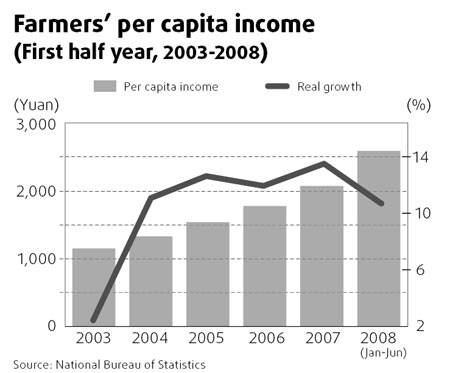In Hunan province, a survey found that a ton of the major fertilizer, carbamide, cost 660 yuan in 2002. That amount rose four times to 2,560 yuan this June.
The price of rice, however, reportedly increased by 40 percent in the last five years.
Cai Fulin, a 43-year-old corn farmer in Fuyu county of Liaoning province, had a similar story to tell. The cost of one type of fertilizer he uses rose by 31 percent to 2,500 yuan per ton from the year earlier.
"Our modest income increase has largely been eaten up by the surging cost of fertilizer," Cai said.
Li in Zhongcaiwan village said the price hikes of gasoline and diesel have also hurt.
"The price of diesel has risen by 33 percent to 8 yuan per kilogram from early this year, rising 185 percent from the previous year," Li said.
Faced with the global grain price hike and the rapid increase in production costs, leading economist with Chinese Academy of Social Sciences Zhang Zhuoyuan has urged the government to raise the minimum prices of grain.
"We need a strong commitment to raise the price of grain, which can help increase farmers' income and rekindle their enthusiasm in farming," Zhang said.
"Only then can they secure our grain supply in such a fragile and competitive global market."
To further reduce the financial burden of farmers, the central government recently ordered an inspection of prices and fees charged by local governments for water, electricity, education, homebuilding, cable TV and livestock epidemic prevention services.
"Exorbitant charges must be waived and higher-than-normal fees must be lowered nationwide," the authorities have said in a circular.
Economist Zhang Zhuoyuan said the country still faces a number of challenges in securing the grain harvest this autumn, including potential floods, drought, typhoons and pests possibly disrupting crops.
The country's wheat output this summer topped 120 million tons, 2.5 million tons more than a year ago, figures from the Ministry of Agriculture have showed.
But summer crops usually account for about 23 percent of annual grain output, far less than the autumn harvest, ministry figures showed.
"We need farmers to be committed to the sector if we are to feed our people," Zhang said.
"Fattening their pockets is one way to do that."

(China Daily July 25, 2008)